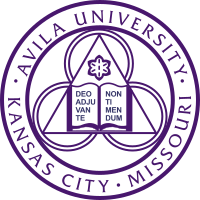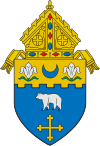 | |
| Former names | College of St. Teresa (1916–1961) Avila College (1961–2002) |
|---|---|
| Motto | Deo adjuvante non timendum |
| Motto in English | With the help of God there is nothing to fear. |
| Type | Private university |
| Established | 1916 |
| Religious affiliation | Roman Catholic (Sisters of St. Joseph of Carondelet) |
| President | James Burkee |
| Students | 1,527 (2019) |
| Location | Kansas City, Missouri, United States 38°54′45″N 94°35′29″W / 38.9126°N 94.5915°W / 38.9126; -94.5915 |
| Colors | Purple, gold and black |
| Nickname | Eagles |
| Sporting affiliations | NAIA – KCAC |
| Mascot | Dominic the Eagle |
| Website | www |
 | |
Avila University /ˈævɪlə/ is a private Roman Catholic university in Kansas City, Missouri. It is sponsored by the Sisters of St. Joseph of Carondelet and offers bachelor's degrees and master's degrees. Its 13 buildings are situated on a campus of 50 acres (20.2 ha) in Kansas City. The school enrolled 1,527 students in 2019.
History
In 1916, on the same campus at 5600 Main Street as St. Teresa's Academy, the Sisters of St. Joseph of Carondelet founded the College of Saint Teresa. St. Teresa's College was founded as a two-year college for women only. The first graduates of St. Teresa's College received their degrees in 1918.
In 1939, Kansas City Bishop Edwin O'Hara announced that St. Teresa's junior college would be expanded to a full four-year college, and the college would be housed in its own building on the campus. In 1940, ground was broken for Donnelly Hall, and it opened for classes in 1941. The first four-year graduating class received their degrees in 1942. In 1948, the college established a department of nursing, offering both a three-year diploma and a four-year bachelor of nursing degree.
In May 1961, Sister Mary Daniel Tammany, president of the College of St. Teresa, announced the purchase of 49 acres of land for a new campus at 119th and Wornall Road in the Red Bridge neighborhood near the southern edge of Kansas City, Missouri. The high school, St. Teresa's Academy, is still operating on the original site. At the groundbreaking for the first building on the new campus, the announcement was made that the college would be renamed Avila College, still in honor of Saint Teresa of Avila. In 1969 Avila began admitting male students, and in 1978, the college began offering graduate programs in business, education, and psychology. Avila College became Avila University in July 2002.
Student body
Of the 1,710 students attending Avila University in the fall of 2016, females outnumber males 62 percent to 38 percent. 57 percent of students are Caucasian, 20 percent are African-American, 10 percent international, and eight percent Hispanic. 20 percent are Catholic. The average ACT score of the incoming freshman class is 23. About 31% of students live on campus.
Academics
Avila University is divided into three colleges. Each College has a collection of Schools for the various programs:
- College of Liberal Arts & Social Sciences
- School of Humanities
- School of Performing Arts
- School of Psychology
- School of Social Sciences
- College of Science & Health
- School of Natural and Applied Sciences
- School of Computer Sciences & Mathematics
- School of Imaging Sciences
- School of Nursing
- College of Professional Schools
- School of Business
- School of Education
- School of Visual and Communication Arts
- Avila Institute for Professional Studies
Campus

Avila's campus sits on 50 acres (20.2 ha) in southern Kansas City, Missouri. There are 13 buildings that include four residence halls, a fieldhouse, theatre, student union, library, as well as academic buildings. The campus sits close to the Missouri-Kansas border.
Student life
Student life at Avila is quite active with more than 40 student organizations. There are no fraternities or sororities on campus.
Residential life
Carondelet Hall was the first residence hall built at the current Avila University location. Carondelet houses up to 122 students at its maximum capacity. Ridgway Hall has the same floor plan and room dimensions. The 29,000-square-foot Thompson Hall opened in the fall of 2007. It houses 65 students and staff in 16 suites. In fall 2012, Avila opened its fourth residence hall, Avila Hall (later dedicated as Glenna Wylie Hall), a 39,000-square-foot three-story residence hall on the northeast edge of campus. Avila currently has capacity to house up to 390 students on campus.
Athletics

The Avila athletic teams are called the Eagles (formerly known as the "Avalanche" until 1990). The university is a member of the National Association of Intercollegiate Athletics (NAIA), primarily competing in the Kansas Collegiate Athletic Conference (KCAC) since the 2018–19 academic year. The Eagles previously competed in the Heart of America Athletic Conference (HAAC) from 2000–01 to 2017–18; as well as in the defunct Midlands Collegiate Athletic Conference (MCAC) from 1994–95 to 1999–2000.
Avila competes in 14 intercollegiate varsity sports: Men's sports include baseball, basketball, bowling, football, soccer and wrestling; while women's sports include basketball, bowling, soccer, softball, volleyball and wrestling. Avila also has award-winning cheerleading and dance teams.
History
In 2011, the athletic complex was expanded to provide facilities for football and soccer games to be played on campus. A 194,000 square foot multi-purpose athletic field was constructed, featuring a Shaw Sportexe Legion synthetic turf system. Avila's football team played its first on campus game on September 17, 2011, against Missouri Valley College.
References
- ^ "Trends in Headcount Enrollment, 2013-2019". Missouri Department of Higher Education. Retrieved July 20, 2020.
- "Avila University Athletics Quick Facts". June 13, 2015. Retrieved August 29, 2022.
- ^ "The education and care of the "dear neighbor" for 145 years in KC". The Catholic Key. March 31, 2011. Retrieved May 2, 2015.
- "Facts and Stats about Avila University and Its Students - About Avila". avila.edu. Archived from the original on September 23, 2015. Retrieved May 2, 2015.
- ^ "Avila University builds up Kansas City campus with millions in renovations". Kansas City Business Journal. September 30, 2011. Retrieved May 2, 2015.
- "Largest Kansas City-Area Colleges and Universities". Kansas City Business Journal. December 1, 2017. Retrieved December 5, 2017.
- "Greek Life Disappears". Talon News Magazine. May 2006. p. 4.
- "Hollis+Miller Project". hollis-miller.com. Archived from the original on March 4, 2016. Retrieved May 2, 2015.
- "New residence hall, courtyard dedicated at Avila University". The Catholic Key. October 12, 2007. Archived from the original on March 5, 2016. Retrieved May 2, 2015.
- "Fourth Residence Hall completed". PMA Engineering. Archived from the original on July 3, 2013.
- "Reshall Construction Updates - Campus life at Avila University". avila.edu. Retrieved May 2, 2015.
- "FOUR SPORTS TO BE FEATURED ON AVILA UNIVERSITY'S NEW SHAW SPORTEXE FIELD". August 15, 2011. Archived from the original on August 21, 2012.
- "25 New College Football Systems". daktronics.com. Archived from the original on December 7, 2019. Retrieved May 2, 2015.
External links
Categories:- Avila University
- Private universities and colleges in Missouri
- Universities and colleges in Kansas City, Missouri
- Sisters of Saint Joseph colleges and universities
- Universities and colleges established in 1916
- Association of Catholic Colleges and Universities
- Catholic universities and colleges in Missouri
- Roman Catholic Diocese of Kansas City–Saint Joseph
- 1916 establishments in Missouri
- Former Midlands Collegiate Athletic Conference schools
- Former women's universities and colleges in the United States
